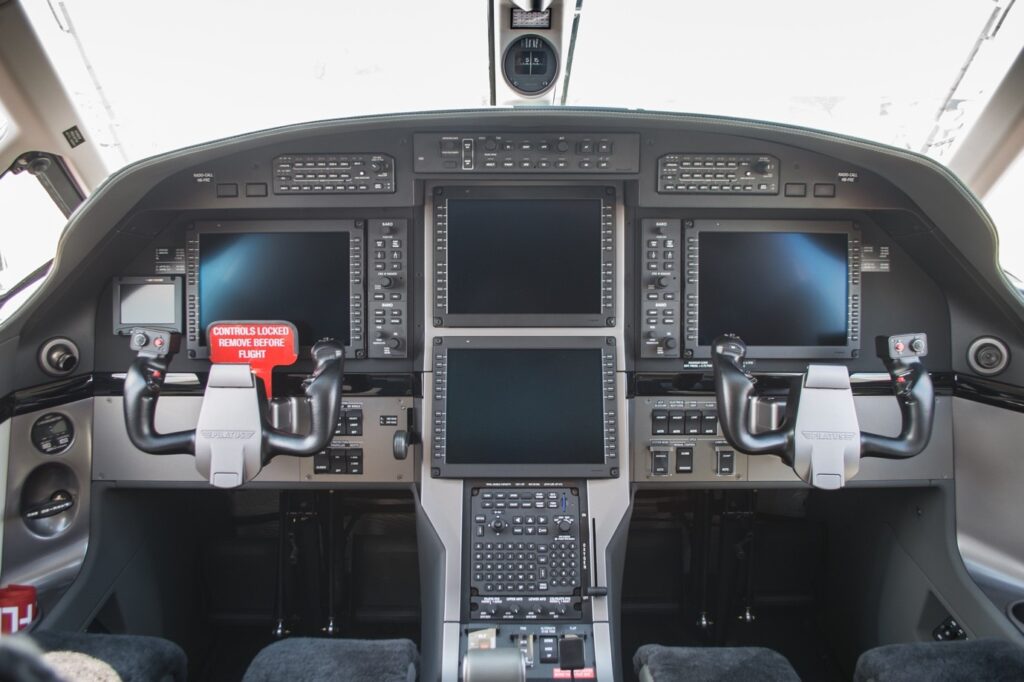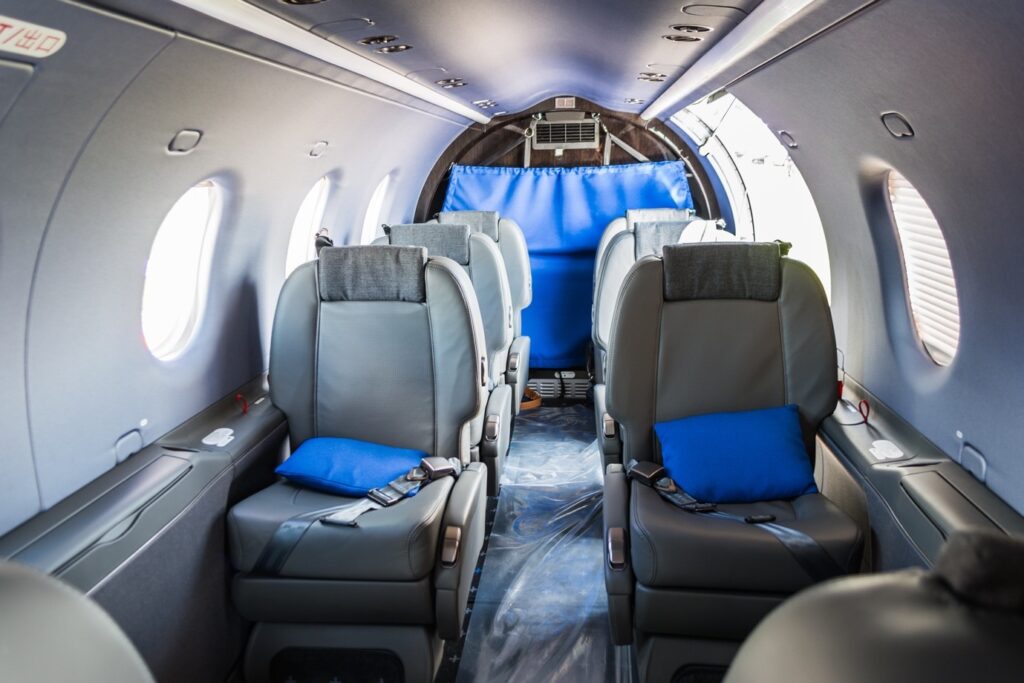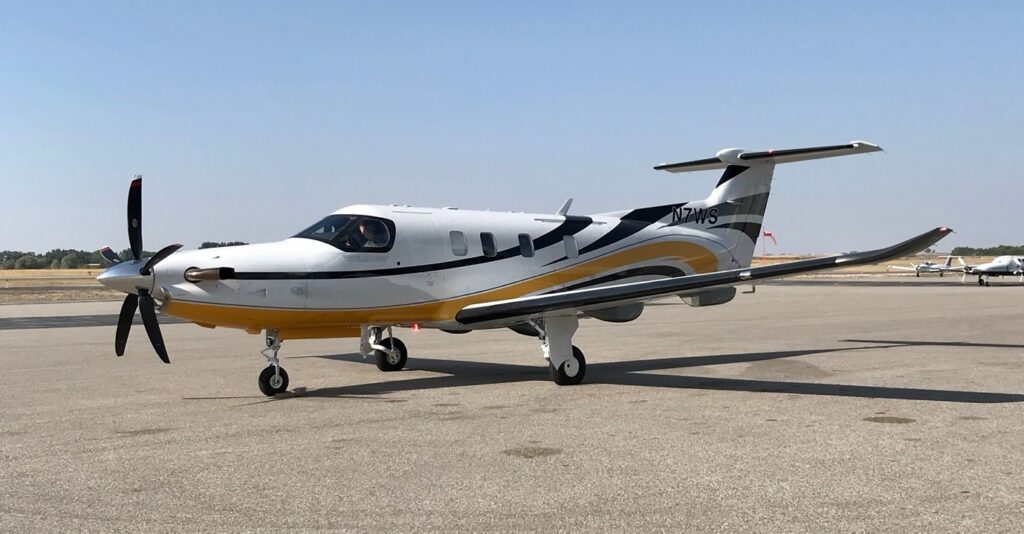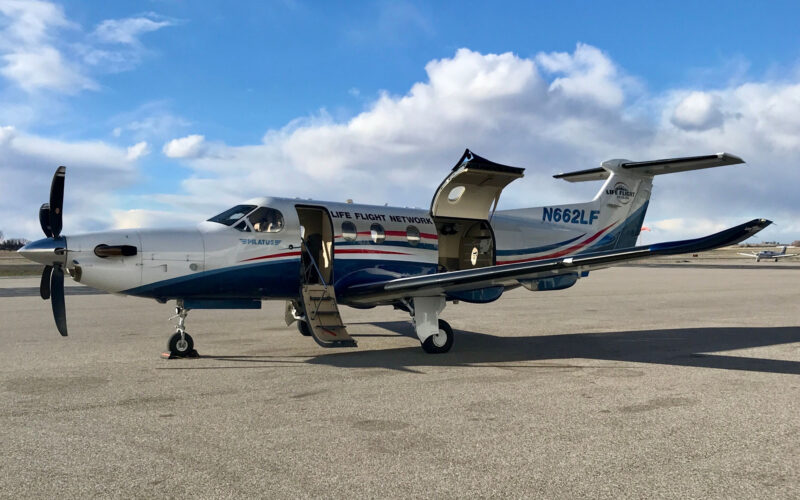An aircraft that has gained popularity due to its versatility, the Pilatus PC-12 combines the capabilities of private, business, and leisure travel as well as military operations.
This article will take a deep dive into the features, benefits, and drawbacks of the Pilatus PC-12, highlighting its technical specifications, design, variants, and applications.
Overview of the Pilatus PC-12
Manufactured by Pilatus Aircraft, the Pilatus PC-12 is a testament to Swiss engineering excellence. Introduced in 1994, this single-engine turboprop aircraft has garnered a reputation for its reliability, versatility, and cost-effectiveness, with over 2,000 deliveries made as of March 2023. The Pilatus PC-12 platform stands out as the most successful aircraft in the Single Engine Turboprop segment, considering its impressive sales figures.
One of the key factors contributing to the PC-12’s success is its adaptability across various aviation sectors. It seamlessly combines the capabilities of a business jet and a leisure aircraft, catering to the diverse needs of both corporate travelers and adventure enthusiasts. This adaptability is due to its modern design and performance characteristics.
Performance and range
Equipped with a Pratt & Whitney PT6A-67P turboprop engine, the PC-12. engine is known for its robustness and low maintenance requirements, ensuring minimal downtime and operational costs. With a maximum cruise speed of 285 knots (528 km/h) and a range of 1,845 nautical miles (3,417 km), the PC-12 can effortlessly connect distant destinations without the need for frequent refueling.
The aircraft’s short takeoff and landing (STOL) capabilities allow it to access smaller airports and remote airstrips, opening up a wider range of landing options and reducing the need for additional ground transportation.
In terms of safety, the PC-12 boasts advanced avionics systems, including the Honeywell Primus Apex avionics suite. This modern package offers enhanced situational awareness, weather radar, traffic collision avoidance systems and advanced navigation capabilities.

Technical specifications
Below is a table showcasing the technical specifications of the Pilatus PC-12NG (New Generation):
| Technical Specifications | PC-12 NG |
| Engine | Pratt & Whitney Canada PT6A-67P turboprop |
| Engine Thrust | 890 kW (1,200 shp) |
| Maximum Takeoff Weight (MTOW) | 10,450 lbs (4,740 kg) |
| Maximum Payload | 2,357 lbs (1,069 kg) |
| Maximum Cruise Speed | 285 knots (528 km/h) |
| Maximum Range | 1,845 nm (3,417 km) |
| Service Ceiling | 9,144 m (30,000 ft) |
| Cabin Length | 16.11 ft (4.91 m) |
| Cabin Width | 5.0 ft (1.52 m) |
| Cabin Height | 4.10 ft (1.25 m) |
| Seating Capacity | Up to 9 passengers |
Design and comfort
The Pilatus PC-12 boasts as described by its manufacturers an elegant and sleek design that exudes both comfort and style as characterized by Pilatus Aircraft. Its cabin has seating capacity for up to nine passengers.
Its sturdy airframe and high-wing configuration provide stability and maneuverability, making it well-suited for challenging environments and diverse weather conditions. The large clamshell doors at the rear of the aircraft enable the easy loading and unloading of cargo, further enhancing its versatility.
The interior can be fully customized to suit individual preferences, with options for luxurious leather seats, exquisite cabinetry, and advanced entertainment systems. The adaptability of the PC-12 allows for flexible seating arrangements, making it suitable for private, business, leisure travel, and military operations.

Applications and uses
The Pilatus PC-12 is highly used in the leisure and adventure travel industry. Its ability to access remote airstrips and operate in diverse terrains, including mountainous regions, makes it a preferred choice for adventurers and outdoor enthusiasts.
Furthermore, the PC-12 has found utility in medical evacuation and air ambulance services. Its spacious cabin can be easily converted to accommodate medical equipment and personnel, allowing for the safe and swift transportation of patients in critical conditions. The aircraft’s range, plus its ability to operate from smaller airports, makes it an invaluable asset in emergency medical situations.
The PC-12 has also gained popularity in government and military applications, serving as a reliable platform for transportation, surveillance and reconnaissance missions. Its ability to operate from short and unimproved runways, combined with its range and payload capacity, make it an asset in various defense and security operations.
In May 2023 a remarkable milestone was achieved, with the delivery of 2,000th PC-12 aircraft of the type. Its main operators include commuter and private charter airlines in Canada, the United States, and other countries. Also, some governments and military forces.
Other variants of PC-12
PC-12/41
The first variant was the PC-12/41, introduced in Switzerland in 1994. It featured an increased maximum take-off weight (MTOW) of 9,039 lbs (4,100 kg), allowing for higher payload capacity. This variant also incorporated various aerodynamic improvements to enhance fuel efficiency and performance.
PC-12/45
Built upon the success of its predecessors, the PC-12/45 was launched in 1996. It introduced a more powerful Pratt & Whitney PT6A-67B engine, providing improved climb performance and higher cruise speeds. The PC-12/45 also boasted an increased MTOW of 9,921 lbs (4,500 kg), allowing for greater flexibility in carrying cargo and passenger loads.
PC-12/47
With its certification granted in 2005, this variant saw an impressive boost to its MTOW, reaching 4,740 kg (10,450 lb).
PC-12/47E
Also known as the PC-12 NG, this variant was first introduced in 2008. In particular, it introduced various enhancements, including a redesigned cockpit layout, improved soundproofing, and advanced Honeywell avionics options.
PC-12M Spectre
The PC-12M Spectre variant was developed specifically for military applications. It offers increased operational capabilities and versatility to meet the requirements of special missions. The Spectre features additional military-grade avionics, secure communications systems and provisions for specialized equipment. It has been utilized for various military operations, including intelligence, surveillance and reconnaissance missions.
U-28A Draco
The U-28A Draco is a specialized military variant of the PC-12/45. It serves as a light transport and intelligence platform for the United States Air Force (USAF). The U-28A is equipped with advanced avionics and communication systems, enabling it to conduct sensitive and strategic missions. It is often deployed in support of special operations forces and plays a vital role in providing situational awareness and logistical support in challenging environments.
Drawbacks of utilizing a Pilatus PC-12
Limited speed
When compared to business jets, turboprops such as the PC-12 exhibit a slower maximum speed. Opting for a business jet like the Pilatus PC-24 would be more appropriate for those seeking to minimize flight duration, especially during longer flights spanning 2-3 hours.
Cabin noise
If the flight agenda involves meetings or the passengers are particularly sensitive to noise, quieter alternatives to the PC-12 are available. For instance, the PC-12 NGX, a third-generation iteration of the classic model, offers a notable reduction in cabin noise through the activation of a slower propeller mode, enhancing the in-flight environment.
Newest variant PC-12NGX
Building upon the success of the PC-12NG, Pilatus has introduced the PC-12NGX, the latest variant in the PC-12 series. During the National Business Aviation Association’s (NBAA) Business Aviation Convention & Exhibition in October 2019, Pilatus publicly announced the PC-12NGX, which had already received Federal Aviation Administration (FAA) and European Union Aviation Safety Agency (EASA) certification.
The PC-12NGX brings in significant improvements in performance, technology and comfort. One of the key upgrades is the incorporation of the Pratt & Whitney PT6E-67XP engine. This engine offers increased power output and fuel efficiency, contributing to improved climb performance and higher cruise speeds.
The PC-12NGX features an enhanced cabin experience, with refined interior design and advanced amenities. The NGX variant also has a low-speed propeller mode which offers improved soundproofing for a quieter and more serene in-flight experience.
In terms of avionics, the PC-12NGX is equipped with an advanced touchscreen-controlled avionics suite, known as the Advanced Cockpit Environment (ACE). The ACE system integrates various functions, including flight management, communication and navigation, into a user-friendly interface, enhancing pilot efficiency and reducing workload.
The PC-12NGX also benefits from improved safety features, including enhanced situational awareness systems, advanced weather radar and an optional Synthetic Vision System (SVS). These features further improve the aircraft’s capabilities in challenging weather conditions and low-visibility situations.
As of June 2023, the aircraft is available to purchase for $6.028 million.


